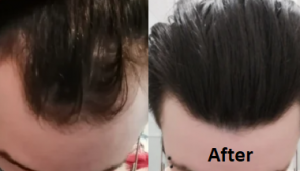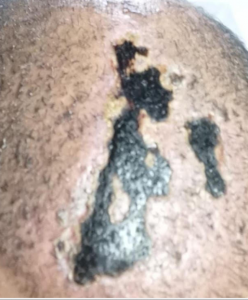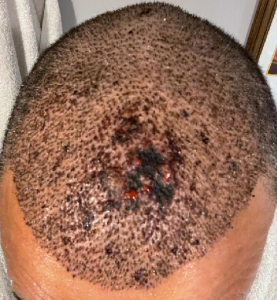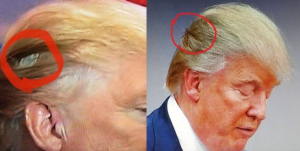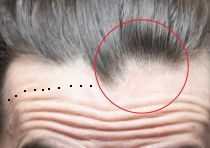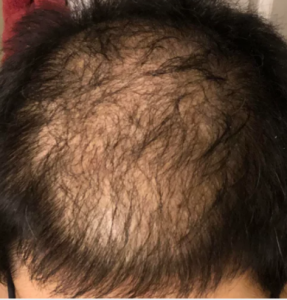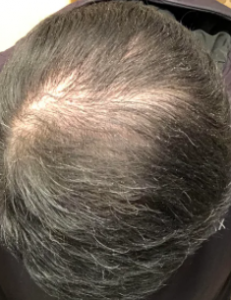15 days post-op. 5500grafts.Istanbul. My surgeon said that its a healing infection, not necrosis. He asked me to keep taking blood thinners and antibiotics. The earliest dermatologist appointment I found is in one week. What should I do?
It looks like necrosis. You should be able to see a hair transplant surgeon in the country you are in who can make the diagnosis for you with some certainty and then follow your healing. if it is necrosis, these black areas will evolve into a scar without hair growth. I am sure that this necrotic area goes down to the skull, so would care is very important. A good doctor is key here to make sure that it doesn’t get worse.
It is not likely at 5 months. I have been prescribing this drug since it came on the market to possibly 10,000 patients or more. I listen to them and draw conclusions from my experience. At 5 months, finasteride is in balance with your body and the initial shed that occurs in some men, appears only in the first month or two. If you are shedding now, it may be an acceleration of your genetic hair loss process
I want to know what I would look like after surgery (typical look). For instance, what impact will the surgery have on my appearance at various intervals after the surgery, especially since we are talking about grafts to the front that everyone will see when I meet them. I am also concerned that if I currently have miniaturizing happening in the front what this area is transplanted (I have had very recent hair loss and erosion of the hairline and frontal area). I am concerned that the addition of grafts could negate the densifying goal of the surgery. In other words, the existing miniaturizing hairs will leave due to the shock of the implantation of donor hair.
I would have to see how much miniaturization you have in the frontal area to estimate what you could lose. Taking finasteride usually protects against shock loss (those miniaturized hairs). Your overall appearance will look like you did before the surgery (assuming you don’t get instant growth or the rare patient who develops pimples) and as the new hair grows in, it is like watching grass grow, never see it but sooner or later, the lawn will look green. Here are some examples (good and bad)
- https://baldingblog.com/terrible-post-operative-care-after-hair-transplant-photo/
- https://baldingblog.com/one-day-post-op-2150-grafts-photos/
- https://baldingblog.com/post-op-photos-6-days-after-3320-grafts/
- https://baldingblog.com/one-day-post-op-with-photo/
- https://baldingblog.com/two-post-operative-patients-photos/
- https://baldingblog.com/another-patient-one-day-procedure-1600-combined-strip-fue-surgery/
- https://baldingblog.com/wp-admin/post.php?post=3823&action=edit
- https://baldingblog.com/transplanting-the-frontal-corner-6-months-post-op-with-photos/
- https://baldingblog.com/had-3000-fue-grafts-1-week-ago-what-are-the-cracks-on-my-head/
To answer the question about miniaturization, see this post: https://baldingblog.com/creating-a-personalized-master-plan-for-present-and-future-balding-photos/. As you can see at the bottom of the post, are excellent photos of cut hair follicles so that I can actually count (a) the hairs per follicular unit thereby calculating the total permanent donor supply of the individual because these photos were taken from the donor area as marked, and (b) I can count miniaturization if he had it. To do this, I would count all hairs in the field and then count all miniaturized hairs in the field. From that I can determine how much miniaturization is present. In this man, there is no miniaturization of the donor hairs which is almost always the case, except in a man that might have Diffuse Unpatterned Alopecia (DUPA) a condition that dictates that a hair transplant should never be performed. For men who have significant miniaturization, a hair transplant can kick out these miniaturized hairs but for men on the drug finasteride, this risk is significantly reduced.
It’s not unusual for hairlines to recede asymmetrically.
I am not comfortable at microneeding the recipient area of a hair transplant because the skin is sensitive to such conditions as folliculitis.
Sir i sometimes looses hairs from donor area i Haven t done hair transplant yet but i want to get it done in my future. My donor area hairs falls sometimes sometimes 4-5 hairs. Donor looks perfect no thinning baldpatches or anything but sometimes i loose hairs
All hairs cycle between anagen (growth) and telogen (sleep when these hairs often fall out). The average male has a 2 – 3 year cycle. That calculates at 100 hairs per day lost if the cycle is 3 years.
The clip that shows, is just one of probably many that bond a hair system to his growing hair on the sides of his head. I have been told that he has had hair transplants as well, so that is another fixation point to clip a hair system to him. Since his normal remaining hair grows at a rate of 1/2 inch per month, the hair system clips must be reattached every few weeks or the hair system will become loose.
It is hard to imagine that anyone would want this, or that even if someone was to want it, that any provider would deliver this end product. The SMP is a painted wall of blue colored ink in front of this poor man’s hairline. Something is wrong here. The good news is that this can be removed with a laser.
The widow’s peak is a left over remnant of your juvenile hairline. On the left side of the photo (this man’s right side) I drew with dots where his 5 year old hairline probably was. As you can see, the Widow’s Peak lowest boundary, goes to the highest crease of the furrowed brow, the location of the juvenile hairline.
The key is how much you take in a week. If you take 1/2 of a 5mg Proscar pill. that is like taking 2.5 mg over how say 3 days, almost a full dose. It’s half life is 4-6 hours in the blood stream, but it imbeds in the hair follicle a few weeks and that is when it does its job.
Probably a stupid question but if you started balding at an early age (let’s say early 20s) does it just continue until nothing is left or does it stop at some point?
Men continue to bald to their final genetically inherited pattern. That is often evident by age 26-30 but it may go into decades of slow progressive loss in some men.
Does dutasteride cause permanent fertility though? I want to stop a month before trying to get a child, will this be okay?
Stop it and get a sperm count with your doctor. The half life of this drug is 5-6 weeks so it will take many months for it to be out of your body, Dutasteride is known to reduce sperm count.

